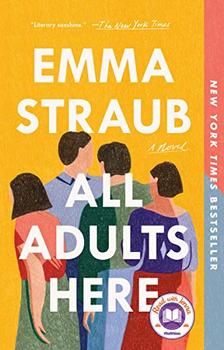Summary | Excerpt | Reading Guide | Reviews | Beyond the Book | Readalikes | Genres & Themes | Author Bio

Chapter 1
The Quick Death
Astrid Strick had never liked Barbara Baker, not for a single day of their forty-year acquaintance, but when Barbara was hit and killed by the empty, speeding school bus at the intersection of Main and Morrison streets on the eastern side of the town roundabout, Astrid knew that her life had changed, the shock of which was indistinguishable from relief. It was already a busy day-she'd spent the morning in the garden, she had a haircut appointment at 11:30, and then her granddaughter, Cecelia, was arriving by train with two suitcases and zero parents (no school bus accidents there-just a needed escape hatch), and Astrid was to meet her at the Clapham station to bring her back to the Big House.
The bus hit Barbara just after eleven. Astrid was sitting in her parked car on the inner lane of the roundabout, the verdant circle at the center of town, adjusting her hair in the mirror. It was always the way, wasn't it, that one's hair always looked best on the day of a scheduled trim. She didn't wash her hair at home unless they'd gone to the beach, or she had been swimming in chlorinated water, or some foreign substance (paint, glue) was accidentally lobbed in her direction. No, Birdie Gonzalez washed Astrid's hair every Monday and had done so for five years, before which it had been washed by Nancy, at the same salon, Shear Beauty, which was located on the southeastern side of the roundabout, in the quarter circle between the Clapham Credit Union and Susan's Bookshop, kitty-corner from Spiro's Pancake House, if you peered through the open sides of the white wooden gazebo at the grassy island's center. The professional hair washing was a relic from her mother's generation, and an affectation that her own mother had not possessed, and yet, there it was. It was not a pricey indulgence, if weighed against the cost of proper conditioner. On every eighth Monday, Birdie also gave Astrid a trim. Nancy had given slightly better haircuts, but Birdie was better with the shampoo, and Astrid had never been vain, only practical. Anyway, Nancy had retired and Astrid hadn't missed her. Birdie was from Texas, and her parents were from Mexico, and Astrid thought of her as human sunshine: bright, warm, sometimes harsh, but always good for one's mood.
It was the end of the summer, which meant that soon, from Monday to Friday, Clapham would belong to the year-rounders again. Kids would go back to school, and the summer inhabitants would go back to being weekend inhabitants, and life would return to its quieter pace. Astrid inspected her skin for spots. Ticks and skin cancer were the twin fears of anyone who spent time outdoors in the Hudson Valley, certainly for those over the age of twenty-five. In the rearview mirror, Astrid watched Clapham go about its morning routines: women with rolled-up yoga mats plodded slowly out of the municipal hall, well-off summer residents strolled the sidewalks, looking for something to buy that they had somehow missed during the last three months, locals sat drinking coffee at the counter at Spiro's and at Croissant City, where every sixty-five-year-old man in Clapham could be found with a newspaper at 7:30 a.m., seven days a week. Frank, who owned the hardware store, which sold everything from window fans and fresh eggs to batteries and a small collection of DVDs, was standing beneath his awning as his teenage son pulled up the iron gate. The small shops that sold T-shirts and sweatshirts that read clapham in large block letters didn't open until noon. The fanciest clothing store on Main Street, Boutique Etc?, whose name Astrid had always found both grammatically and philosophically irritating, opened at noon, too, which Astrid knew because she begrudgingly bought most of her clothing there.
Astrid let her eyes wander to the eyesore, the bte noire of every Clapham resident, both year-round and summer interloper-the unweildy, trapezoidal building that had been empty for a year, the large space inside totally bare except for things abandoned by the most recent tenant: a ladder, two cans of paint, and three overstuffed garbage bags. There was a Sold sign in the window, with a telephone number, but the telephone number had long since been disconnected. The county records, which were available to anyone who cared to look-and Astrid had-said that the building had indeed been sold a year ago, but no one knew to whom, and whoever it was, they'd done nothing but let the dust bunnies proliferate. What went in was important: If it was some big-box store, or a national chain, it would be war. A death knell for the town as the residents knew it. When Rite Aid came in, not even to Clapham proper but to the outskirts of town, which did need a pharmacy, people lost their minds. Astrid still had a keep local, shop small sign in the dirt next to her mailbox. She'd spent her own money making the signs and distributing them. And if that had been in the village itself? Astrid couldn't imagine. If the person who bought the building didn't know or didn't care, there would be riots in the street, and Astrid would carry the biggest pitchfork.
Excerpted from All Adults Here by Emma Straub. Copyright © 2020 by Emma Straub. All rights reserved. No part of this excerpt may be reproduced or reprinted without permission in writing from the publisher.
Tread softly because you tread on my dreams.
Click Here to find out who said this, as well as discovering other famous literary quotes!
Your guide toexceptional books
BookBrowse seeks out and recommends the best in contemporary fiction and nonfiction—books that not only engage and entertain but also deepen our understanding of ourselves and the world around us.